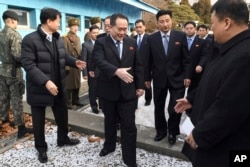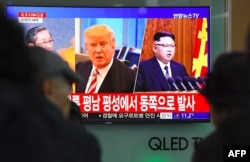North and South Korea agreed Tuesday to hold military talks to improve relations, the two nations announced after their first formal discussions in more than two years.
The rival nations said in a joint statement they have agreed to "defuse the current military tension and to hold military talks to address the issue."
North Korea also agreed Tuesday to participate in the PyeongChang Olympics to be held in February in South Korea.
These agreements came out of high-level Inter-Korean talks held Tuesday in Panmunjom, the so-called "peace village" straddling the border where the 1953 armistice that ended the fighting in the Korean War was signed. The talks were aimed at facilitating North Korea's participation in the Olympics, and finding ways to reduce heightened tensions over Pyongyang’s growing nuclear and missiles development programs.
The White House later said President Trump has committed to sending a "high-level" delegation to the Winter Olympics, and praised the agreement between Seoul and Pyongyang.
"North Korean participation is an opportunity for the regime to see the value of ending its international isolation by denuclearizing," said a spokesman for the National Security Council.
The U.S. State Department said the U.S. is in close consultations with South Korean officials "who will ensure North Korean participation in the Winter Olympics does not violate the sanctions imposed by the U.N. Security Council over North Korea’s unlawful nuclear and ballistic missile programs. "
New Year’s gift
Ri Son Gwon, the head of the North Korean delegation and the chairman of the Committee for the Peaceful Reunification of North Korea, set an optimist tone for the meeting.
“We came to this meeting today with a serious and sincere attitude and with the thought of giving our brethren, who have high hopes for this dialogue, invaluable results as the first present of the year," he said.
South Korean Unification Minister Cho Myoung-gyon, who led his country’s delegation in the talks, expressed hope that this first official inter-Korean meeting in two years will lead to further dialogue and cooperation.
“Our talks resume after the North and South Korean ties have been severed for a long time, but I believe the first step is half the journey. I would like to hold this meeting with tenacity and perseverance,” he said.
Olympic cooperation
At the talks, North Korea agreed to send to the Olympics a delegation of high-ranking officials, athletes, a cheering squad, a Taekwondo demonstration team, and a number of journalists.
Currently only two North Korean figure skaters have qualified for the games. Although North Korea missed the deadline to participate in the 2018 games, the International Olympic Committee could still extend invitations to compete.
South Korean media had earlier reported that the government in Seoul was prepared to suspend unilateral sanctions imposed on North Korean officials and the state run airline Air Koryo, which might prevent the North from participating.
Seoul proposed that the Olympic teams from the two Koreas march together in the opening ceremony.
South Korea also proposed setting up further talks to organize for reunions of separated families around Lunar New Year's holiday that will occur during the Olympics.
And Seoul called for subsequent military talks, and emphasized the need to negotiate a denuclearization deal to achieve peace on the Korean Peninsula.
The inter-Korean Olympics dialogue already succeeded in reopening direct communication between Seoul and Pyongyang that was severed in early 2016 following a North Korean nuclear test and rocket launch.
“At least the telephone hotline is open. So that means that even if we get into some dark stuff, we get into additional ballistic missile drills or a nuclear test, we might see an opportunity of the North calling up the South,” said Michael Madden, a visiting scholar at the U.S.-Korea Institute at the School of Advanced International Studies at Johns Hopkins University (SAIS.)
But many see the talks as a delay tactic by the North, which is perfecting its nuclear and ballistic missile technology.
"What they're essentially trying to do is essentially buy time. They're very very close to actually developing a nuclear weapon that can hit the United States mainland. The challenge is, they're probably about a few months away," says Harry Kazianis, director of defense studies at the Center for the National Interest in Washington.
Since taking office in May of 2017, South Korean President Moon Jae-in has tried to increase dialogue and engagement with the North while also supporting strong sanctions against Pyongyang for developing nuclear weapons and ballistic missiles.
Allies cautious
The U.S. has expressed cautious support for the inter-Korean talks and agreed to postpone joint military exercises with South Korea until the after games.
U.S. President Donald Trump, who in the past has said negotiations with the Kim government are useless, this week called the new talks "a good thing" that came as a result of "firm, strong" stance, and that the U.S. would get involved in the negotiations "at the appropriate time.”
But the State Department has voiced concern that Pyongyang "might be trying to drive a wedge" between Washington and Seoul and weaken U.S.-led efforts to force North Korea to give up its development of nuclear-tipped missiles capable of hitting the United States.
Japan's Chief Cabinet Secretary Yoshihide Suga on Tuesday also welcomed North Korean interest in joining the Pyeongchang Games but also reiterated that Pyongyang’s nuclear program remains a grave international threat and that the U.N. sanctions imposed on Pyongyang must continue to be strictly implemented.
Youmi Kim in Seoul and Pete Heinlein from the White House, contributed to this report.


